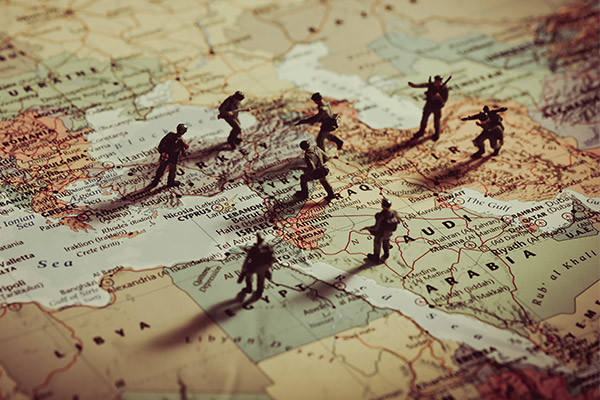Not new policies, but new Middle Eastern states
Israel’s recent military actions mark its transformation into a fully engaged Middle Eastern power, willing to bear human and strategic costs. Prime Minister Netanyahu’s escalation against Iran signals a major regional shift, challenging long-standing deterrence dynamics. The Iranian regime may endure military losses but risks collapse if key strategic tools are neutralized. Gulf states watch cautiously, knowing any post-regime scenario in Iran could deeply affect their security and economy. A weakened or restructured Iran might bring either regional stability or a new era of fragmentation and uncertainty. Netanyahu’s gamble raises questions: is he forging a safer Middle East—or creating a new challenge to Israel’s own dominance?
- by Rasha Al Joundy ,
- Tuesday, 17th June, 2025
The Middle East did not wake up on June 13th to a new war, nor did it awaken on October 7th to a sudden declaration of a regional order upheaval. Rather, what is unfolding is a transformation that has been building since 1979, surviving numerous turning points—from the invasion of Iraq, to the assassination of Rafic Hariri, and the war in Syria. Each of these events steadily eroded the Arab axis while empowering a counter-axis built by the Iranian Islamic regime. What the region is now witnessing is the emergence of new Middle Eastern states, with Israel at the forefront of this transformation.
Until now, Israel did not consider itself part of the traditional pattern of Middle Eastern wars—conflicts that accept destruction and human loss under the justification of supreme national interest. Until June 13th, Israel approached its military engagements through a Western, particularly American, lens—meticulously counting casualties. That posture is now changing.
Israeli Prime Minister Benjamin Netanyahu's decision to launch a military operation against Iran—and to equate Tehran with Beirut in terms of strategic targeting—was undeniably shocking. It constituted a direct threat: Netanyahu appeared prepared to strike deep into Tehran to reach Iranian leadership and military infrastructure, regardless of the cost. In doing so, Netanyahu has initiated a direct confrontation with the most formidable military adversary in the region, defying widespread assumptions that such a war was improbable due to the immense mutual deterrence it would entail. But that improbable war is now unfolding.
For the Iranian regime, it is a system that does not measure defeat in the loss of human lives, but in losing tools of battle and deterrence, one of the most expensive tools is its nuclear program, nevertheless there is, as yet, little indication that Israeli strikes have neutralized Iran’s nuclear capabilities. This suggests that Netanyahu will likely persist in his campaign in the foreseeable future. Should Iran's regional proxies respond, Israel seems prepared to strike them as well, potentially opening up multi-front engagements in Iraq, Lebanon, and Yemen.
What remains unclear is whether Iran's leadership fully grasps the gravity of the current situation, or Netanyahu’s resolve to eliminate all military threats to Israel, be they political regimes, militias, nuclear programs, or weapons production sites, regardless of the cost. The absence of such awareness poses a strategic threat not only to Iran but to the broader region.
Netanyahu has already plunged Israel into the longest military engagement in its history with operations in Gaza, operations that, while not balanced in terms of power, still carry humanitarian and political weight, especially on Israel’s position on the global stage. More significantly, Netanyahu has repositioned Israel as a fully-fledged Middle Eastern state, shedding the myth that Israeli lives are too precious to risk. This was evident both in his handling of Israeli hostages held by Hamas and in his apparent willingness to accept Israeli casualties in a broader confrontation with Iran.
Strategically, striking Iran’s nuclear facilities carries an immense risk of radioactive fallout, the impact of which will depend on variables such as geographic reach, proximity to population centers, water sources, wind patterns, and the depth of contamination. Netanyahu, by adopting this strategy, is wagering Israel’s long-term fate, an extraordinary gamble for a leader of a state embedded in the very region that may suffer from the fallout.
If this war continues at its current pace with the Israeli objective of crippling the Iranian regime, and if Tehran refuses to accept the Trump administration’s conditions for de-escalation, the likely outcome could be the fall of the Iranian regime within months. That raises profound questions about what would come next: a new military regime closely aligned with the ideological orientation of the Islamic Republic but with superficial political and doctrinal reforms? Or a regime born from the long-standing Iranian opposition, dating back to 1979? Much of this will depend on the strategies pursued by the United States, Israel, and regional powers.
One scenario that cannot be ruled out is the secession of ethnic minorities such as the Kurds and Arabs in Ahvaz, representing an opportunity for marginalized national movements within Iran that could lead to dismantling Iran to several independent provinces or even countries, especially if chaos prevailed and there was no ability in the central government to control it.
For the Gulf Cooperation Council (GCC) states, the destruction of Iran’s nuclear capabilities would have been more beneficial had it occurred earlier, before the development of advanced conventional and unconventional military infrastructure in Iran and before the threat of nuclear fallout became real. Unlike the swift preemptive strike on Iraq’s nuclear ambitions, Iran was allowed to develop its arsenal over decades, without decisive action from either Israel or the United States. That delay has raised the strategic and humanitarian cost of any future confrontation.
Today, Iran represents a tangible military threat due to its armament, its proximity, Should the Iranian regime feel it is on the brink of collapse, the regime will likely make the decision to strike American interests in the Gulf and threaten maritime routes, even at the risk of triggering direct U.S. military involvement that could end the war and the regime; albeit at great cost in Iranian cities.
As an end outcome to this war, would this destruction in Iran lead to a new state aligns with the West, like what happened with post-WWII Japan? Or would it result in a fragmented, unstable state similar to post invasion of Iraq? Regardless of the outcome, the Gulf states, pursuing ambitious economic and developmental visions, will bear the lion’s share of the economic, security, and political consequences of Israel military action.
For the GCC, any regime that follows the current Iranian government holds strategic significance for future relations. Caution prevails in the Gulf region, there is nobody calling for regime change in Iran. The Shah’s Iran was a Western ally but not a friend of the Gulf, having seized the three UAE islands in 1971. The Islamic Republic after seizing power in 1979 continued hostilities by weakening Arab states and fracturing national identities into sectarian allegiances.
The question today is whether Netanyahu will continue this war until Iran is transformed into a new Middle Eastern state aligned with both the Gulf and the West. Would such a transformation mirror the post-Assad Syrian scenario, with sanctions swiftly lifted? Or is Iran too complex, too entrenched in its ideological and structural rigidity, for the kind of sudden transformation that both Netanyahu and Trump may be betting on?
A deeper question remains: is Netanyahu genuinely pursuing a positive scenario, a modern Iran, friendly to the Gulf and the West? Or would such a transformation challenge Israel’s strategic dominance in the region, which means a different type of challenge?

Rasha Al Joundy
Research Supervisor
Read More
Areas of Expertise
- Expert in the Gulf region politics,
- Security and internal affairs and has been working on the GCC region since 2011.
Education
- Master’s degree in International Relations and World Order at Leicester University (UK 2016).
- Graduated from the Faculty of Law – University of Damascus in Syria in 2006
Bio
completed her master’s degree in International Relations and World Order at Leicester University (UK 2016). She graduated from the Faculty of Law – University of Damascus in Syria in 2006, and trained as a lawyer to register at Damascus bar association. She is an expert in the Gulf region politics, security and internal affairs and has been working on this region since 2011. Rasha Currently work as a senior researcher for Gulf affairs and supervise the training program at Dubai Pubic Policy Research Centre.

